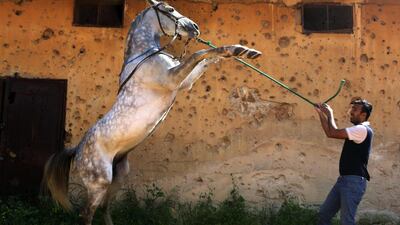Beirut // The Hippodrome has survived wars and relentless upheaval but as it approaches its centenary the Lebanese capital’s famous racetrack is facing an uncertain future.
Built in 1916 by the Ottoman Turks, the Hippodrome was a neutral site during Lebanon’s civil war where rival fighters used to gather on their days off to bet. But now the racecourse is suffering financial difficulties and a dearth of investment.
Should it close for good, one of the Beirut’s last remaining green spaces could fall into the hands of property developers who have already turned the capital into a concrete jungle.
“The city council refuses to invest, each time offering a different excuse, and this really worries us,” said Nabil de Freige, head of the Society for the Protection and Improvement of the Arabian Horse.
Mr de Freige, who is also Lebanon’s minister for administrative reform, fears that the country’s ancient tradition of horse breeding will suffer a heavy blow if the racetrack shuts.
“This place provides a livelihood for trainers, jockeys, grooms, employees, vets, breeders and farmers – 1,500 families in total, and all that will disappear,” he said.
Before Lebanon’s 1975-1990 civil war, the track was the only one in the Middle East where horse-racing fans could gather to place their bets.
Races were held twice a week, bringing in about US$500,000 (Dh1.84 million) a week in wagers.
But the war reduced the number of horses kept in stables around the racecourse from 1,500 to 350.
“Races were no longer held, and the bets dropped to no more than $150,000” a week, said racecourse general manager Nabil Nasrallah.
With an area of 200,000 square metres in the heart of the Lebanese capital, the Hippodrome is a potential gold mine for developers.
“If the Hippodrome closes, what guarantee would there be” that the land will not go to builders, Mr de Freige asked.
Mr Nasrallah believes the only way forward is for the city council, which owns the racecourse, to invest in rebuilding the site.
“We should be subsidised, like in any other country where there are horse races,” he said.
Beirut mayor Bilal Hamad, a Sunni Muslim, is reluctant to invest public money in a site where betting – prohibited in Islam – takes place.
“The Hippodrome is part of Beirut’s heritage. Why should bettors alone have access to it?” said Mr Hamad.
He said he would only agree to pour public funds into the racecourse if it were opened to all residents.
Mr Hamad plans instead to set up what he calls Beirut Central Park – a golf course complete with an artificial lake, as well as a riding school.
But Mohammed Ayoub, who heads an NGO named Nahnoo, meaning “Us”, denounced the idea.
“A golf course – that’s a project for the rich. Also, how can we create an artificial lake while we’re suffering from a water shortage?” he said.
“The city council wants to set up a costly commercial project and then hand it over to a private company.”
Situated on a former civil war front line that divided Christian, Sunni and Shiite neighbourhoods, the racecourse is a mirror of recent Lebanese history.
A wall riddled with bullet holes still bears the green and red symbol of the French Foreign Legion, painted in 1982 by soldiers deployed in the small Mediterranean country at the height of the war.
“Militia fighters used to shoot at each other all week and meet here on Sunday to place their bets,” recalled Ali Ahmed Seif Eddine, a horse trainer.
Rival militia leaders would even meet in a secret hall under the stands.
The racecourse’s various entrances allowed fighters to arrive from parts of the city that were blocked off from each other, and it was public enough to allay any fear of ambush or kidnapping.
During the 1982 Israeli invasion of Lebanon, Israeli forces positioned behind the Hippodrome pounded Palestinian fighters on the other side.
With the stables caught in the crossfire, it became impossible to reach them. About 350 horses fell ill in the stifling summer heat and 17 died.
To remove the surviving animals, Mr de Freige secured a truce thanks to then-president Elias Sarkis, a lover of horses, and US special envoy Philip Habib.
Like much of Beirut however, the racecourse did not fully recover.
Once the horses had been removed, “Israel’s air force and tanks destroyed all the stands, for no reason at all,” Mr de Freige said, and reconstruction was never completed.
* Agence France-Presse

